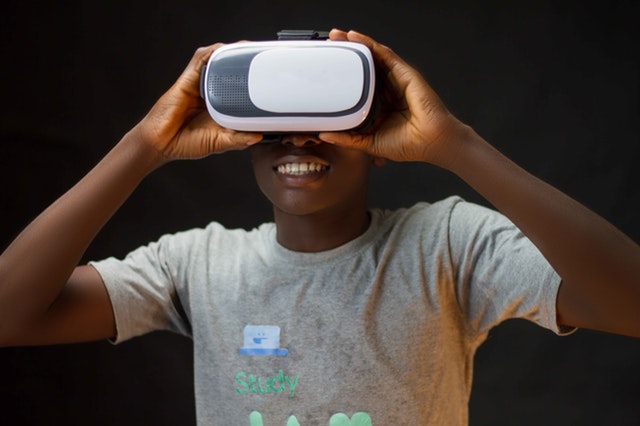
As COVID-19 ravaged the world, extended reality grew in Nigeria. Two Nigerian extended reality companies talk to TechCabal about the current state and the challenges facing the growth of extended reality on the continent.
One of the many effects of the COVID-19 pandemic on the Nigerian media industry is that the consumption of media online sky-rocketed. The rate at which people went to the cinemas dropped significantly, costing the Nigerian cinema industry an estimated $116 million. Media consumers found other ways to get entertained, and streaming platforms like Netflix had a record-breaking year.
Before the pandemic, the Nigerian digital media sector’s revenue grew from $732 million in 2018 to $806 million in 2020, a 7.49% increase fueled by revenue from online subscriptions. In 2023, it is anticipated that the sector will bring in roughly $900 million.
This adoption also shows its face in the Nigerian virtual and augmented reality space.
Extended reality (XR) is the umbrella term for virtual reality (VR)—a digitally simulated immersive experience that either mirrors the real world or an imagined world—and augmented reality (AR)—the real-time integration of digital information with the user’s physical environment, much like social media filters. The worldwide virtual events market was estimated at $114.12 billion in 2021, and it is expected to increase at a compound annual growth rate of 21.4% from 2022 to 2030.
The current applications of virtual and augmented reality in Nigeria can be traced to Imisi3D, a Nigerian extended reality creation lab, and its 2016 hackathon. The event, a first of its kind, showcased efforts by Nigerians using extended reality to create solutions in wide-ranging sectors from farming to e-commerce.
Today, more Nigerian companies are incorporating virtual reality technology into their business. Taeillo, a Nigerian furniture maker, is one of them. Realising that the pandemic would limit physical inspection of its furniture, the company decided to use augmented reality to showcase its products.
According to Solomon Akinsanya, the Head of Marketing at Taeillo, the use of extended reality has enabled the company to overcome geographic barriers that would have been otherwise unreachable without the use of extended reality.
From his experience building Taeillo’s virtual showrooms with AR, former CTO Derrick Ikenga went on to create Euphoria Labs, a company that focuses on creating metaverse shopping experiences. Having worked with brands like Guinness, Bitnob, Vault Hill, Betking, and Orange Culture, he told TechCabal that he chose to focus on fashion and live shopping because of the abundance of what I ordered vs. what I got scenarios. “Online shopping is broken,” he said.
Ikenga is confident that with augmented reality, this problem will be reduced because people can experience products before buying them. Ikenga wants an improved experience for online shoppers, on par with going to a physical store. He said, “with augmented reality, we are able to create interactive shopping experiences that excite the customer and guide them to make the right shopping decisions.” Ikenga says this should be expected because online shoppers already want AR experiences and are engaging with social AR by the millions daily.
Comparatively, in global e-commerce, experiential retail is slowly taking over the world, with global giants like Nike and L’Oreal opening up experiential stores in New York and Shanghai, respectively. L’Oreal said it saw its conversion rates multiply by 3 when it launched its AR store features.
According to Ikenga, XR in Africa is still in its early days. He believes that Africa has the most to gain from AR/VR because “we can leverage the power of the internet and immersive experiences to connect with the rest of the world on a level playing field.” He sees room for applications of extended reality in education, tourism, entertainment, and e-commerce.
For Kunle Bamigboye, the CEO and co-founder of Coventi, a Nigerian company that uses virtual reality technology to change how Nigerians consume media and entertainment, it simply made sense to focus on the XR industry. On a call with TechCabal, alongside his fellow cofounders Adedokun Bamigboye and Gabriel Ukachukwu, Bamigboye said that the inspiration behind Coventi was the growth of the worldwide virtual events market and the steadily increasing mobile penetration in Nigeria.
Last year, the rate of mobile penetration in Nigeria was 37.34% and is expected to be 48% by 2027. According to PwC, the Nigerian media and entertainment industry is the fastest growing worldwide, with a 12.1% compound annual growth rate. Kunle Bamigboye added that the obvious growth in XR adoption in the media industry on the continent made his company focus on media and entertainment, though they are not limited to only media.
In February 2022, Chocolate City, one of the top music labels in the country, used Coventi’s virtual platform to live stream Blaqbonez’s concert. According to Kunle Bamigboye, hundreds of users joined Blaqbonez’s online concert on the Coventi platform from Lagos, Ibadan, Port Harcourt, Canada, Cyprus, USA, UK, and more. GT Bank has also approached Coventi to be a media partner, and the company is already making plans for GT’s Fashion Week.
But the XR space is not without challenges
Ikenga says that finding talent is the biggest problem in the application of augmented reality on the continent. To solve this, Euphoria Labs is currently training AR creators and plans to set up an academy for creators in the coming year.
For Adedokun Bamigboye, the biggest problem lies in creating awareness and educating the public about the technology. To address this problem, Coventi is using traditional media to showcase how Africa is already applying extended reality. The company also plans to host hackathons in the future.
With more companies using XR across industries from storytelling to marketing, and even more Nigerians engaging with the technology in their day-to-day lives, widespread adoption is around the corner.


















